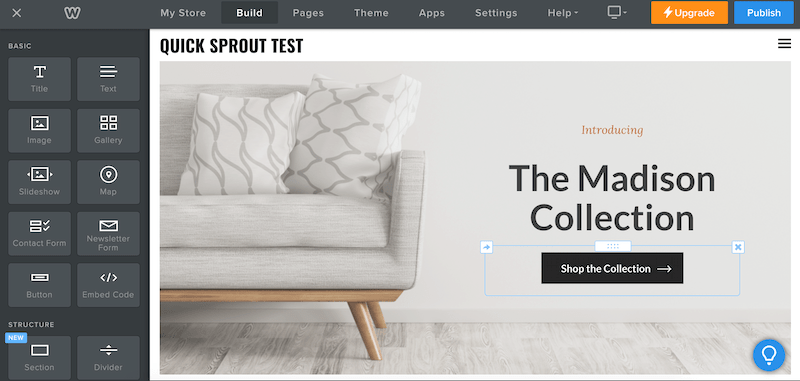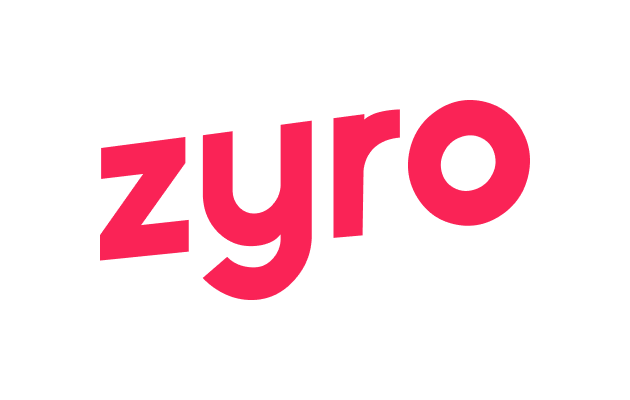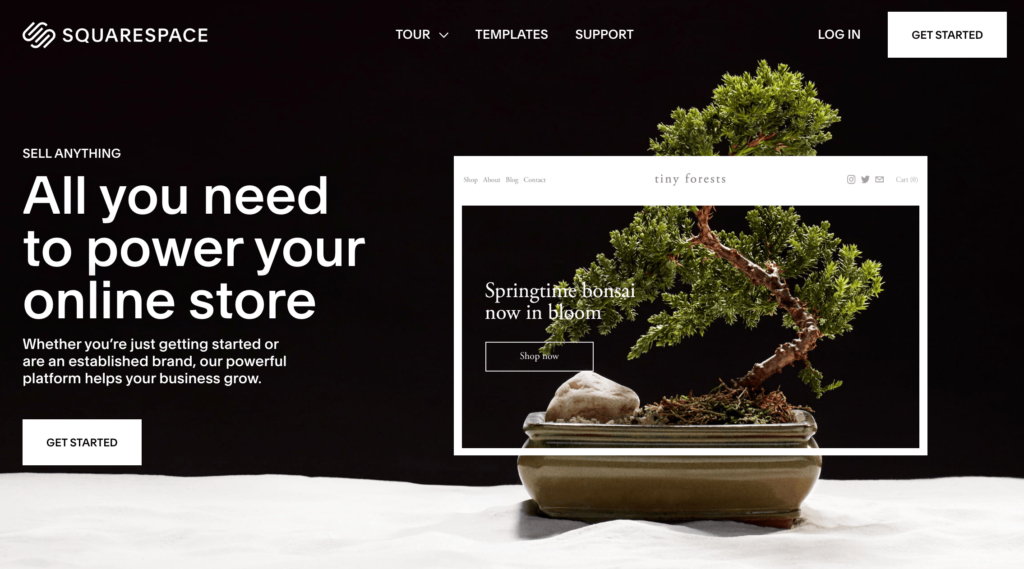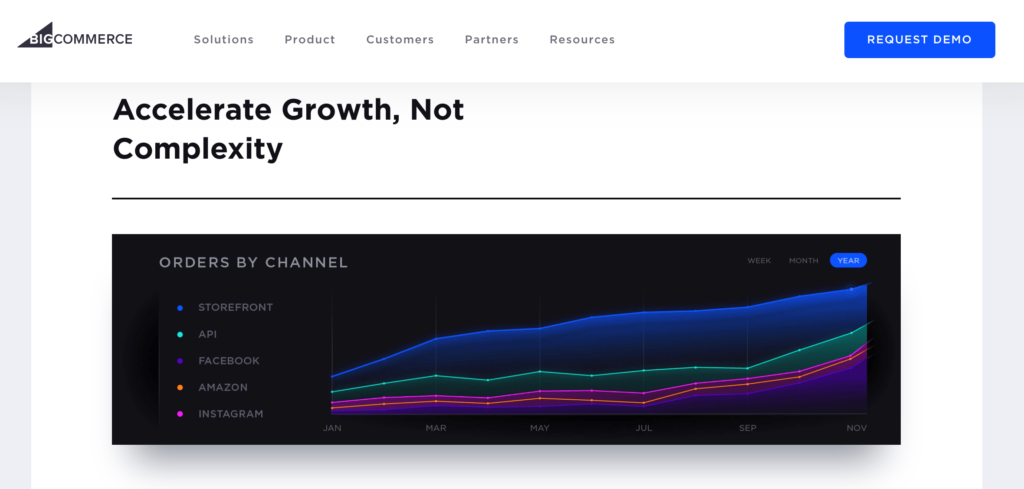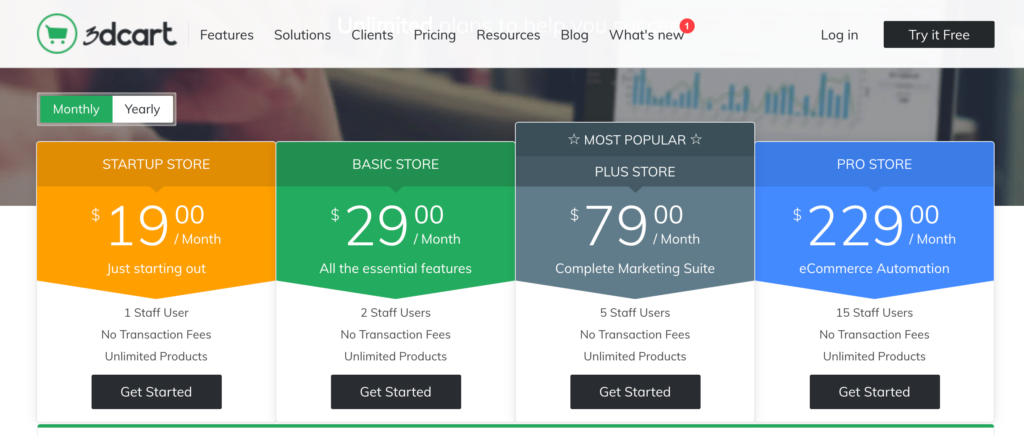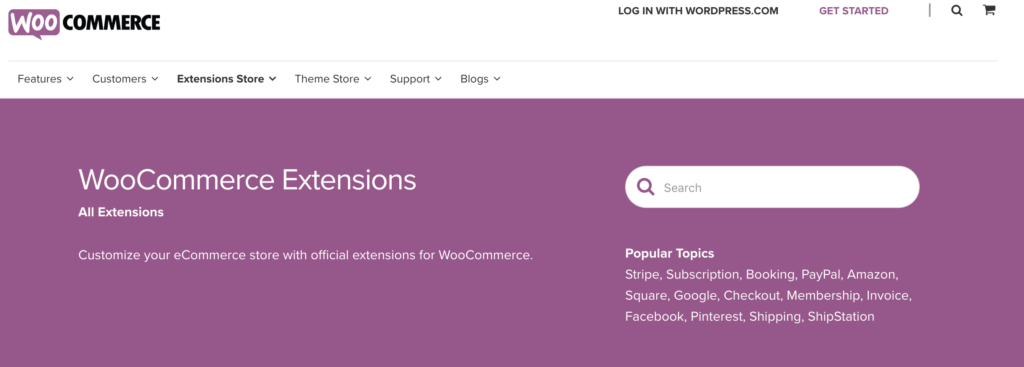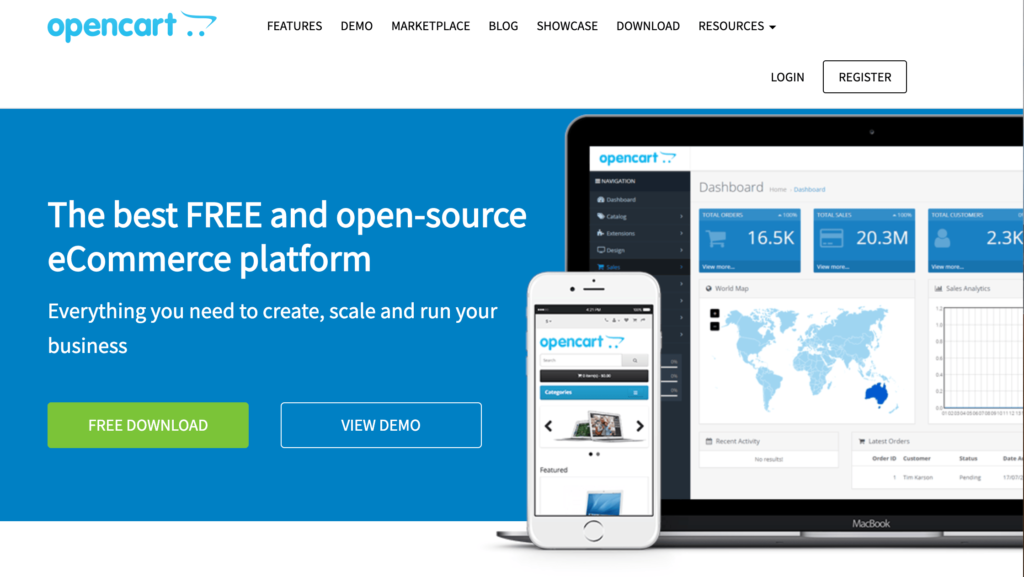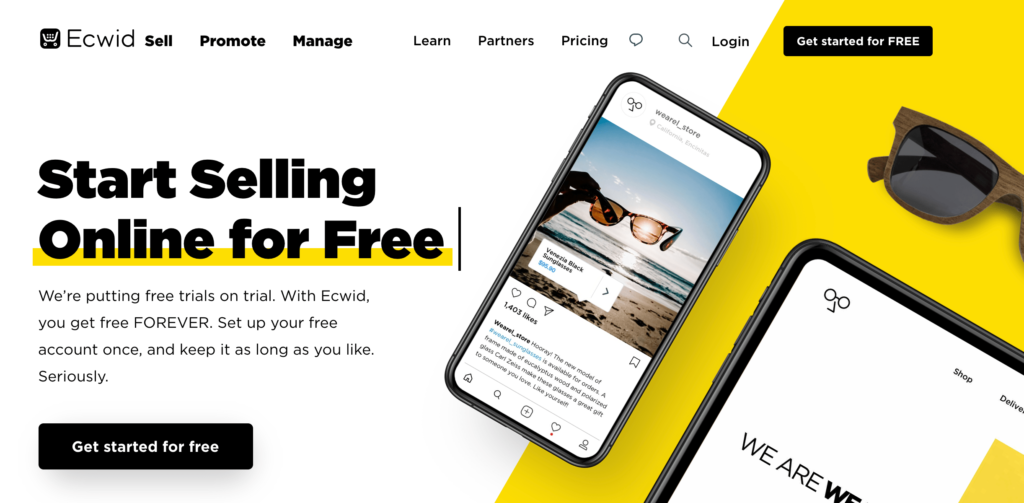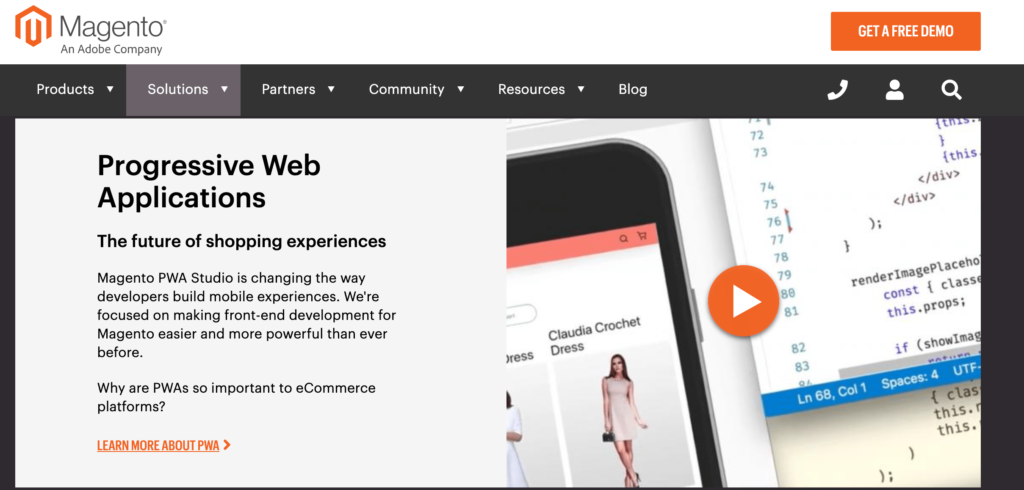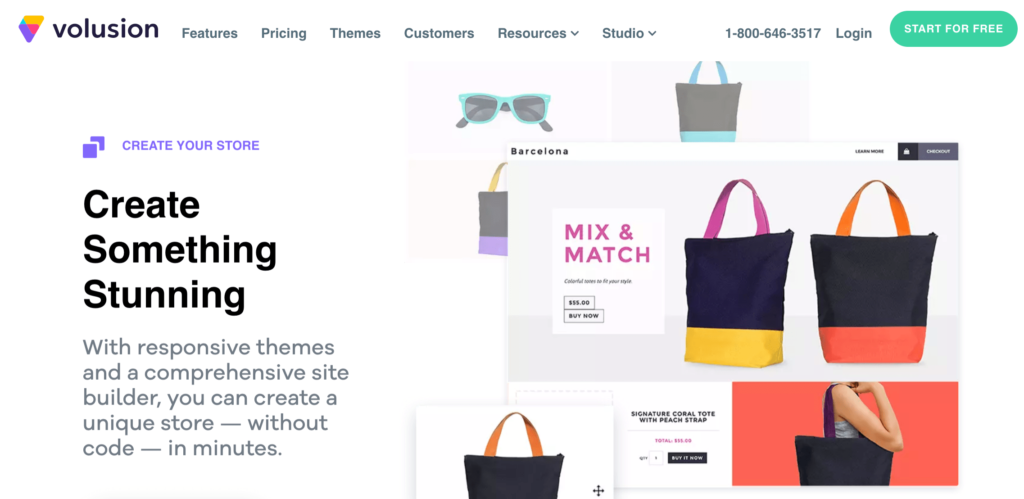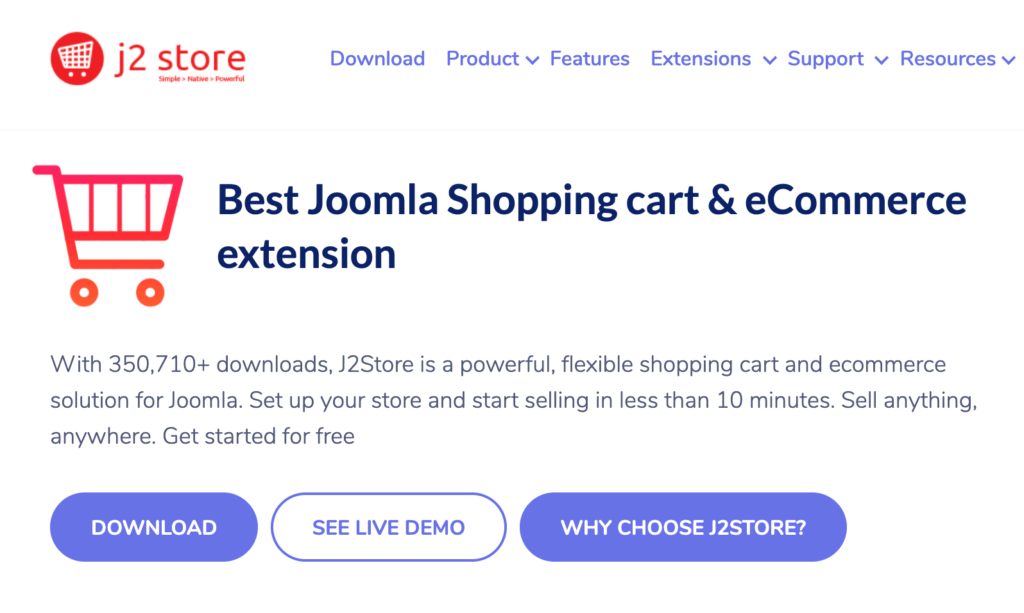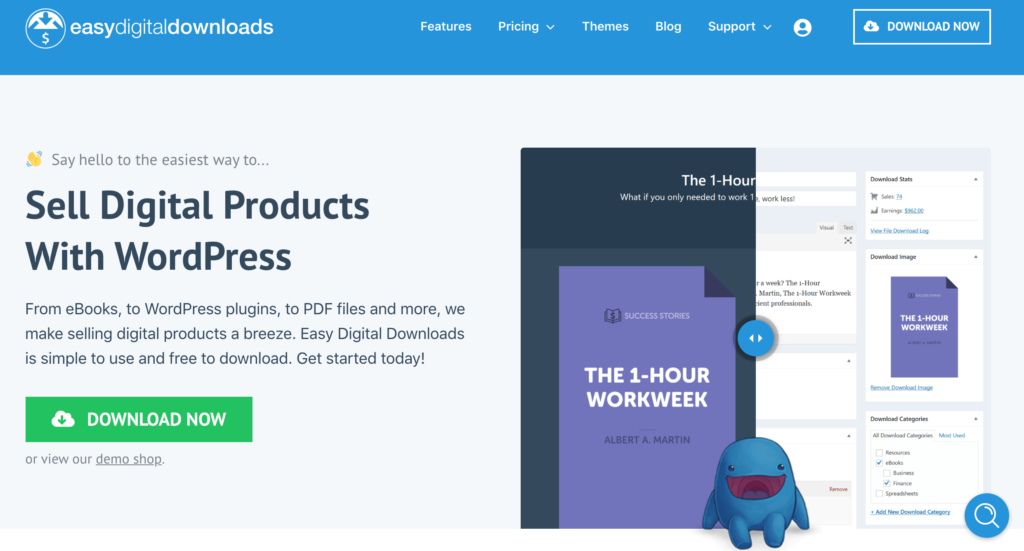Want to jump straight to the answer? The best ecommerce platform for most people is definitely Wix.
Ready to start selling online? You need an ecommerce platform.
An ecommerce platform is software that allows you to create and manage an online store. You’ll use this software to manage your products, site, operations, and everything else related to online sales.
But finding the best ecommerce software isn’t always easy.
The market has become flooded with hundreds of different ecommerce solutions of all types and sizes.
Fortunately, this wide range of options means that the perfect solution for your specific situation is out there. You just need to find it.
Whether you’re starting a new website from scratch or looking to switch providers, this guide will point you in the right direction.
The Top 15 Best Ecommerce Platforms
- Wix
- Shopify
- Zyro
- Squarespace
- BigCommerce
- Square Online
- 3DCart
- WooCommerce
- OpenCart
- Ecwid
- Magento
- Volusion
- J2Store
- Salesforce Commerce Cloud
- Easy Digital Downloads
Below, I’ve highlighted the top features, benefits, prices, and potential drawbacks for each one. I’ll also explain which platforms are best for specific types of online stores.
Wix
- Price starts at $23/mo
- Drag-and-drop site builder
- 500+ ecommerce templates
- Unlimited bandwidth
Wix is a very flexible, drag-and-drop website builder. It can adjust to any of your website creation needs.
The best part about using Wix is an ecommerce platform is its simplicity. Your ecommerce site will get the same drag-and-drop benefits as a traditional Wix website. You just need to choose an ecommerce plan to accept payments online.
For those of you who are already using Wix, you can always upgrade your plan to activate the ecommerce functionality.
Your Wix store manager makes it easy to manage inventory, track orders, and communicate with your customers. With its integrations with bookkeeping software like Quickbooks, Wix really shines as an ecommerce website builder.
Wix has more than 500 ecommerce templates for you to choose from. You can customize your storefront with collections, galleries, related products, and a customer wishlist.
You’ll also be able to set up global shipping rules from multiple carriers. As of right now, Wix does not support dropshipping. But their website says a dropshipping platform is coming soon, so I would expect that within the next year.
Unlike other ecommerce platforms, Wix doesn’t take any transaction commissions. So the only fees will come from the payment processor.
Wix offers four different ecommerce plans; all of which accept online payments:
- Business Basic — $23 per month
- Business Unlimited — $27 per month
- Business VIP — $49 per month
- Enterprise — $500 per month
All plans come with unlimited bandwidth. You’ll get extra storage at each pricing tier.
Wix is new to the ecommerce space. So the platform isn’t perfect. But they’ve definitely made improvements as of late. You’re able to do things like target abandoned shopping carts, which wasn’t always on option. So I expect more of these types of improvements in the years to come.
One such improvement is Corvid by Wix. This is a web development platform that allows you to develop apps using the Wix editor. This might result in better integrations with CRMs in the future.
Shopify
- Price starts at $29/mo
- 24/7 customer support
- Drag-and-drop site builder
- Used by more than one million online stores
Shopify is arguably the most well-known ecommerce platform in the world. They power more than a million ecommerce websites.
As an all-in-one ecommerce platform, Shopify is extremely easy to use and set up right out of the box. It’s a great option for beginners or orgs without a lot of in-house tech solutions.
Shopify is also very versatile. It’s used by small businesses and larger-scale operations alike. Kylie Jenner used Shopify to build her billion-dollar empire selling lip kits from Kylie Cosmetics. But you could use it as a small startup as well.
Another stand out from Shopify is its award-winning 24/7 support, which you’ll have access to even before you sign up for a Shopify plan.
Shopify makes it easy for you to sell products from your online store, as well as through social media platforms, online marketplaces, and in-person with Shopify POS.
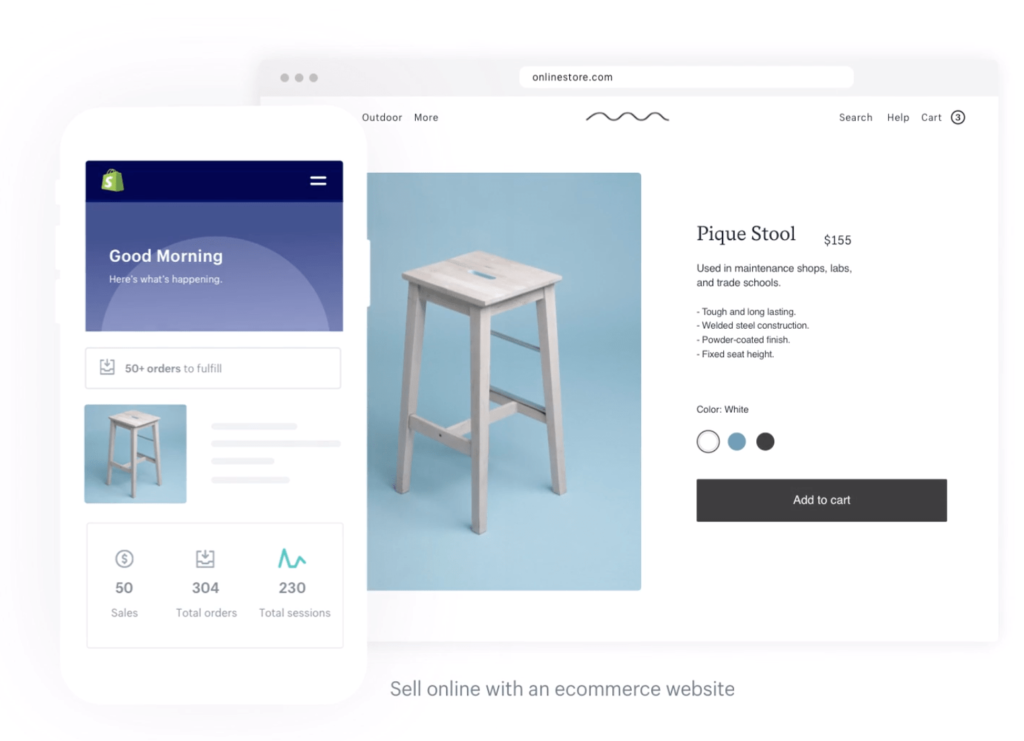
The Shopify drag-and-drop builder is a convenient way to build a new ecommerce website from scratch. All themes are optimized for mobile devices, which is necessary to maximize your conversions.
Shopify even has its own payment processor built-in the platform. It also integrates with more than 3,200 apps in the Shopify App Store.
There are three different base plans offered by Shopify:
- Basic Shopify — $29 per month
- Shopify — $79 per month
- Advanced Shopify — $299 per month
Keep in mind, these are just the base rates. Adding apps, processing payments, and other features will cost you extra.
High volume stores seeking enterprise-grade solutions can get a custom Shopify Plus quote to fit your needs.
The entry-level plan will be enough to get you started, but I’d recommend the mid-tier Shopify subscription at a minimum. It comes with better features like gift cards, professional reports, and better discounts for shipping and payment processing.
Shopify offers a 14-day free trial for all of its plans.
More QuickSprout Shopify Reviews and Guides
- Shopify Review
- How to Transfer Your Website to Shopify
- The Best Ecommerce Website Builder
- How to Create an Ecommerce Website in 9 Easy Steps
- How to Start an Online Store That Drives Sales
Zyro
- Drag and drop website builder
- Plans start at $3.19/mo
- 30-day money-back guarantee
- Tons of beautiful templates
Zyro is another easy-to-use website builder that allows you to create a fantastic website in minutes.
Whether you’re looking to create an ecommerce site, a portfolio to showcase your work, or a simple blog, Zyro offers tons of beautiful templates for you to choose from to help.

Their ecommerce functionality is world class too. Their drag-and-drop website builder allows you to create the perfect online store and customize it to fit your brand. It’s highly responsive too, so you’ll be able to see your changes in real time.
One very unique feature they have is their AI tool. For example, their AI Writer generates text for your website in mere seconds. That means not having to worry about creating compelling copy yourself.
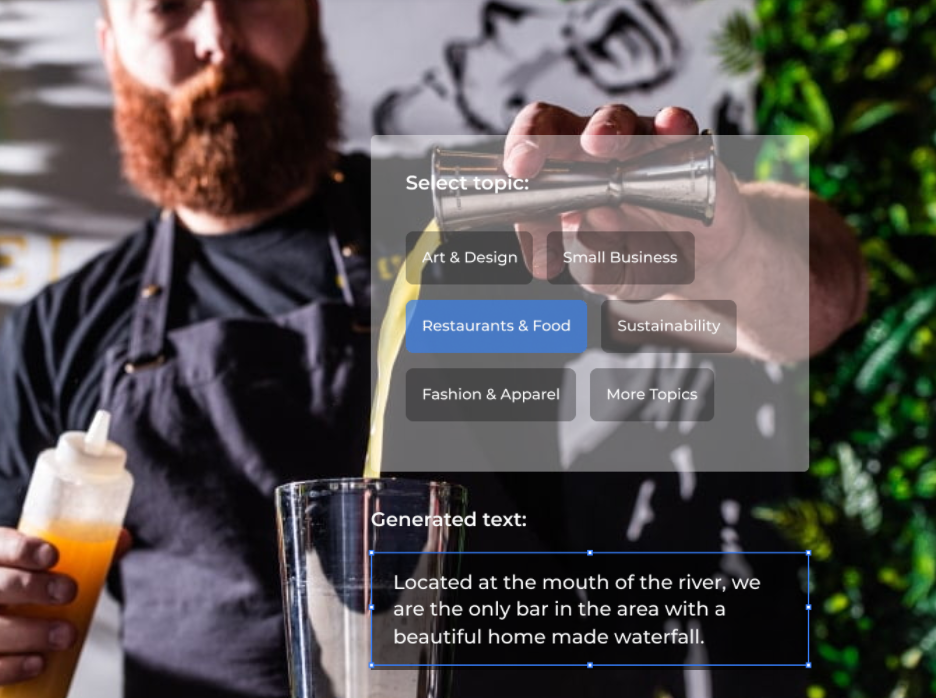
When it comes to pricing, Zyro is very hard to beat. Currently, you can get 80% off full price if you sign up for certain annual contracts. Learn more.
Squarespace
- Price starts at $12/mo
- Unlimited products
- Sell physical & digital products
- 24/7 customer support
Squarespace is another popular website builder. But Squarespace has a fully integrated ecommerce platform built-in to every plan except for the entry-level option.
With Squarespace, building a beautiful website is easy. The templates are modern and fully customizable. You can even install multiple templates to one website and switch between them at any time.
I’d recommend Squarespace to new ecommerce shops that are unsure of what the future holds. That’s because this platform makes it easy for you to scale or pivot the direction of your sales strategy.
Squarespace has dozens and dozens of ecommerce benefits. Here are some of the top highlights to give you an idea of what you’re getting:
- Unlimited products
- Flexible product varients
- Sell physical and digital products
- Manage subscriptions
- Multiple payment methods
- Mobile-optimized checkouts
- Gift cards
- Abandoned cart recovery
The list goes on and on. The drawback of using Squarespace is that there isn’t an app store to add any other integrations or extensions. What you see is what you get. You’ll find that the most popular and useful apps are already built-in, but just make sure you check the full feature list if you need or want something specific.
These are the Squarespace plans and prices:
- Personal — $12 per month
- Business — $18 per month
- Basic Commerce — $26 per month
- Advanced Commerce — $40 per month
As I mentioned earlier, the Personal plan does not have ecommerce capabilities. You can sell online using the Business plan, but you’ll pay an additional 3% transaction fee to Squarespace, and won’t get all of the useful ecommerce features.
At a minimum, I’d recommend the Basic Commerce plan. There are no transaction fees, and you’ll benefit from customer accounts, checkouts on your own domain, ecommerce analytics, social media selling, POS, and other features that you’d expect for an ecommerce shop.
For gift cards, abandoned cart recovery, subscriptions, and a few other higher-level features, you’ll need to sign up for the Advanced Commerce plan.
BigCommerce
- Price starts at $29.95/mo
- Pricing based on annual sales
- Lots of built-in native features
- Multi-channel selling capabilities
BigCommerce has been providing ecommerce solutions for the last decade. During that time, they’ve processed more than $17 billion in merchant sales.
Similar to Shopify, BigCommerce is a robust all-in-one ecommerce platform providing everything you need to sell online. In fact, BigCommerce actually has more native features than Shopify built-in right out of the box.
Although some of you might be a bit overwhelmed by these capabilities and features.
But for people who plan on taking advantage of these extra features, it’s nice to know that you won’t have to pay extra for functionalities.
BigCommerce makes it easy for you to manage sales across multiple channels as well. You’ll be able to sell to customers across platforms like Amazon, eBay, Instagram, and Facebook. BigCommerce also partners with payment solutions like PayPal and Square to allow your customers even more options to purchase your products.
The platform has an outstanding reputation in terms of uptime, loading speed, security, and other performance metrics. They offer unique solutions for B2B stores, wholesale shops, and WordPress users.
BigCommerce has specific options for ecommerce stores in different industries as well.
Whether you’re starting a new online store from scratch, or scaling your brick-and-mortar small business into the ecommerce world, BigCommerce is a top solution for you to consider.
Here’s a quick overview of the BigCommerce plans:
- Standard — $29.95 per month
- Plus — $79.95 per month
- Pro — $249.95 per month
As expected, each tier comes with added features and benefits. But what’s unique about BigCommerce’s pricing is that stores will automatically be upgraded to a new plan if they reach certain sales milestones in a year.
The 12-month sales limits are as follows:
- Standard — Up to $50,000
- Plus — Up to $150,000
- Pro — Up to $400,000
So for example, if you sign up for the Standard plan, you’ll automatically be switched to the Plus plan if you eclipse $50,000 within the last 12 months.
While that shouldn’t discourage you from using them, it’s important to know this ahead of time so you aren’t surprised if your monthly rate increases.
Save 10% off Plus and Pro plans with an annual contract. You can try any BigCommerce plan free for 15 days.
Square Online
- Price starts at $0
- SEO tools
- Great integrations
- Flexible customer connections
Most people know Square for their POS solutions and software. However, they also offer an excellent ecommerce platform.
It’s no surprise that they integrate well with their POS software. So if you’re using Square, you’ll be able to have an accurate count of your inventory as you sell to customers.
With Square’s ecommerce platform, you’ll also be able to do things like book appointments, accept donations, arrange pickups or deliveries, and even sell your products on Instagram.
Square also gives you great online tools to boost your SEO and reach even more customers through the web.
The platform is completely free to start and includes integration with Square POS, automatic inventory sync, and unlimited products for pick and delivery. There is a catch though: It costs 2.9% plus 30 cents per transaction.
For full pricing details, visit the Square Online plans page.
3DCart
- Price starts at $19/mo
- Built-in SEO tools
- Best for experienced users
- 30 day money-back guarantee
3DCart has been in business for more than 20 years. With more than 22,000 merchants using the platform, it’s not nearly as popular as industry giants like Shopify or BigCommerce. However, 3DCart is a great option to consider for advanced ecommerce users.
I’d recommend 3DCart to those of you who have built online stores in the past. If you have experience in the ecommerce industry, 3DCart has capabilities that you can take advantage of.
They don’t offer a drag-and-drop builder, so you’ll need to have a basic understanding of coding and development to customize your themes and templates. But this makes 3DCart a strong choice for any company who has the resources for tech or dev departments.
3DCart stands out as one of the best ecommerce platforms with built-in SEO tools. Here’s an overview of the pricing for its plans:
Similar to BigCommerce, each plan has restrictions in online sales before you’re automatically upgraded to the next tier. Those limits are $50k, $100k, $500k, and $1 million, respectively, for each plan.
Other top features and benefits of 3DCart include:
- No transaction fees
- 24/7 customer support
- 200+ payment gateways
- Integrations with third-party online marketplaces
- Unlimited bandwidth
- Web hosting
- Free domain for one year
One of the drawbacks of 3DCart is that the admin dashboard for managing your site isn’t that user-friendly. Lots of themes and designs are outdated as well.
All 3DCart plans come with a 15 day free trial and are backed by a 30-day satisfaction guarantee.
WooCommerce
- Free to install on WordPress sites
- Easy to customize
- More than 300+ extensions
- Most popular ecommerce solution in the world
WooCommerce is a bit different than the other platforms we’ve seen so far. It’s an ecommerce plugin made for WordPress, as opposed to an all-in-one ecommerce platform.
But with nearly 80 million downloads, WooCommerce is the world’s most popular ecommerce solution. Nearly 30% of all online stores across the globe are powered by WooCommerce.
With WooCommerce, any website running on WordPress can be turned into an ecommerce store.
WooCommerce is free to download and install to your WordPress site. But it requires you to have your domain, hosting, and WordPress account already set up. Then it’s just as simple as installing any other WordPress plugin.
You can customize your store by adding 300+ extensions from the WooCommerce Extensions Store.
This is where you’ll integrate payment processors, subscription tools, and store management features. Lots of these extensions are free, but others are priced up to $300 per extension.
Since WooCommerce is run via WordPress, the customization and capabilities for your online store are virtually limitless. You’ll only need to add features that you plan to use, so you won’t have to worry about anything else cluttering your dashboard.
With all of this in mind, I would only recommend WooCommerce to content-based websites. Meaning the primary function of your site is not the ecommerce capabilities.
For example, if you have a WordPress blog and want to sell 10 or 20 products as a supplemental income strategy, you can install WooCommerce for its ecommerce functions.
But if you want to build a new ecommerce website from scratch and sell hundreds of different items, I’d look for another solution on our list.
OpenCart
- Price starts at $0
- 13,000+ themes and extensions
- Simple interface
- Open-source software
The OpenCart ecommerce platform provides everything you need to create and manage your online store. More than 342,000 ecommerce sites across the globe are powered by OpenCart
OpenCart is not a website builder. It’s an open-source software that you can install to add ecommerce functionalities to your existing website.
One of the reasons why I like OpenCart is because the admin dashboard makes it easy for you to manage everything using a singular and simple interface.
Another major advantage of OpenCart is its marketplace. It has more than 13,000 modules, themes, and extensions. So if you want to integrate something with your ecommerce store, there’s a good chance it’s available on the OpenCart marketplace.
The best part about OpenCart? It’s free to download and install to your website. There are never any monthly or annual fees for using this software.
However, you will have to pay to use certain extensions. But if you’re running a simple ecommerce website and don’t need many premium extensions, OpenCart is a great way to keep your costs down.
If you need help or assistance, there are more than 110,000 registered members active on the OpenCart community forum. You can browse through the 550,000+ posts to see if someone already answered your question.
For dedicated technical support directly from OpenCart, you’ll need to pay. The rate starts at $99 for a one-time fix or $99 per month for advanced ongoing support.
Ecwid
- Price starts at $15/mo
- Compatible with popular CMS platforms
- Easy to scale
- Compatible with popular website builders
If you’re a WordPress user and want an alternative solution to WooCommerce, Ecwid would be my next recommendation.
It’s not nearly as popular as WooCommerce, but it still offers great benefits and specializes in ecommerce sales from multiple marketplaces.
Unlike WooCommerce, Ecwid is compatible with other platforms as well. In addition to WordPress, Ecwid can be added to:
- Wix
- Weebly
- Squarespace
- Joomla
- Tumblr
- Blogger
- Adobe Muse
Basically, you can turn nearly any website into an ecommerce platform with Ecwid. They also offer an easy all-purpose solution for selling on Amazon too in addition to its integrations with CRMs like Salesforce.
Another great benefit of Ecwid is that they have a free forever plan, although its limited to just 10 products. You won’t be able to integrate your online store with other marketplaces for free either.
To get the most out of Ecwid, you’ll need to sign up for a premium plan.
- Venture — $15 per month
- Business — $35 per month
- Unlimited — $99 per month
The Venture and Business plans are limited to 100 and 2,500 products, respectively. As the name implies, there aren’t any restrictions on the Unlimited plan.
As you’d expect, the features and benefits get better as you upgrade to each tier. So you can start off with the entry-level plan and upgrade at any time that you see fit if you outgrow your plan.
Magento
- Price starts at $20,000/year
- Enterprise-level solution
- 1,000+ themes and extensions
- Drag-and-drop page builder
Magento is an ecommerce platform designed for enterprise-level online stores. It’s used by global giants like Nike, HP, Jack Daniel’s, and Canon.
It has specific solutions for businesses that operate as a B2C, B2B, or both. Magento has powerful and robust ecommerce capabilities for any type of website across all industries.
Again, I’d only consider Magento if you have a huge online store. It’s not worth it if you’re a small business or ecommerce startup.
Pricing for a Magento enterprise license starts at over $20,000 per year. They do advertise more options for small business owners, but I’d stay away from those.
Magento is an industry leader in terms of mobile commerce solutions.
You’ll be able to create a PWA (progressive web app) to enhance the user experience for customers shopping from their mobile devices.
Magento has an easy to use page builder with drag-and-drop capabilities. It offers content staging and previews, instant purchases, and merchandising.
You’ll also benefit from customer segmentation features that personalize the customer experience. Use Magento to sell your products through any online marketplace or sales channel.
You can customize your Magento store by choosing from 1,000+ extensions and themes.
Volusion
- Price starts at $26/mo
- Best for stores with large catalogs
- Great customer service
- 30 day money back guarantee
Volusion is a pioneer in the ecommerce industry. For the last 20+ years, over 180,000 websites have used this platform to sell online. More than $28 billion in sales have been processed from Volusion stores.
With Volusion, it’s easy to create your store, sell your products, and scale your business.
This platform is only intended for stores selling physical products. It’s not made to support digital downloads.
Volusion is a great choice for those of you offering lots of products. There aren’t any quantity restrictions for the products offered on your site.
Volusion offers exceptional customer service. But the level of support you get depends on your plan. For example, the entry-level plan does not come with phone support. Here’s an overview of the plans and pricing:
- Personal — $26 per month
- Professional — $71 per month
- Startup — $161 per month
- Business — $269 per month
Shipping rates are determined by your plan is well. Higher-level plans get better discounts.
Similar to other ecommerce platforms we’ve seen, your plan will automatically be upgraded if you exceed certain sales milestones in a 12 month period.
Volusion does have its drawbacks. Lots of their themes seem a bit dated compared to other ecommerce platforms. Volusion also doesn’t have built-in blogging capabilities, so you’ll need to use WordPress or another CMS for that feature.
You can try Volusion free for 14 days. All plans are backed by a 30-day money-back guarantee.
J2 Store
- Price starts at $8.16/mo
- Joomla shopping cart extension
- Supports subscriptions and memberships
- 30 day money back guarantee
I want to start off by saying that J2Store is not for everyone. It’s only made for websites that fall into a very specific category.
J2Store is a shopping cart extension for people using Joomla as a CMS. So it’s not an all-in-one ecommerce platform. You need to already have a Joomla website to use J2Store.
I like J2Store because you can get everything set up in less than 10 minutes. It’s about as easy as it gets for turning a Joomla site into an ecommerce shop.
J2Store has more than 350,000 downloads, has 60+ app integrations, and is compatible with 75+ payment gateways.
In addition to selling physical products online, J2Store also supports subscriptions, memberships, digital downloads, partial payments, and deposits. You’ll also be able to manage bookings and reservations using this Joomla shopping cart extension.
J2Store has the capability to sell products with variants that need to be configured by the customer before checkout.
You can download and install J2Store for free. But to start selling, you’ll need to upgrade to one of the two premium plans:
- Professional — $49 per six months
- Developer — $99 per year
The two plans are basically identical in terms of features. The biggest difference is that the developer plan supports five sites, whereas the professional plan supports unlimited sites.
Both premium plans are backed with a 30-day money-back guarantee.
If you’re using Joomla and want to start selling online. J2Store is a no-brainer. But if you’re starting a new ecommerce site from scratch, I can’t say that using Joomla as your CMS is the best option. I’d look for another choice on our list.
Salesforce Commerce Cloud
- Custom pricing
- Ecommerce and CRM platform
- Ideal for B2B companies
- Leverage AI to drive sales
Salesforce is one of the best CRM platforms on the market today. But recently, they’ve expanded their services into the ecommerce space.
In 2016 Salesforce acquired Demandware, which is a cloud-based ecommerce solution. They rebranded Demandware and named it the Salesforce Commerce Cloud.
This is the best solution for those of you who want a CRM and ecommerce platform in the same package.
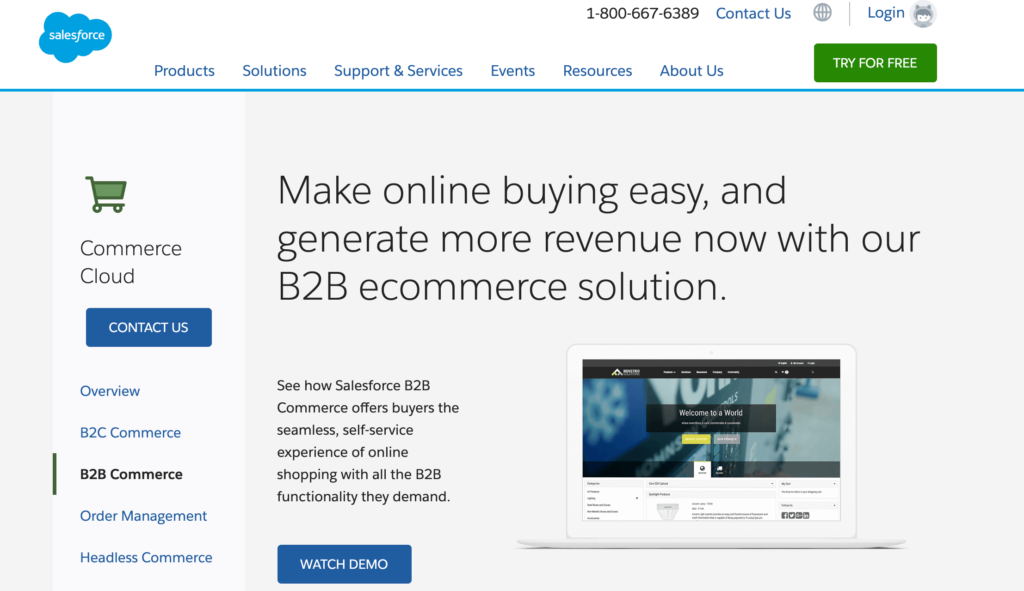
The Commerce Cloud also has B2B-specific ecommerce solutions.
In addition to the CRM and ecommerce software, Salesforce stands out with the AI being used to improve the customer shopping experience. By using “Commerce Cloud Einstein” you’ll be able to leverage sales with data from customer purchase history and browsing behavior.
Salesforce will help you recommend products to users in real-time based on a wide range of factors. Ultimately, this will help you drive more conversions.
Pricing for the Salesforce Commerce Cloud is not transparent on their website. But it’s based on “gross merchandise value.” You need to contact Salesforce to request a quote.
Fortunately, you can try out the Salesforce Commerce Cloud and Salesforce CRM for free with a trial. The length and terms of the trial depend on your unique situation.
Easy Digital Downloads
- Price starts at $99/year
- 100+ themes and extensions
- Sell subscriptions & digital content
- Made for WordPress
As the name implies, Easy Digital Downloads is made for selling digital products online. This plugin is made specifically for WordPress sites. So if you’re not using WordPress, then you’ll need to look for another solution.
Easy Digital Downloads has more than 2,440,000 downloads, 100+ themes and extensions, and 180+ project contributors.
It’s the best plugin for selling digital goods from your WordPress site.
EDD has a full shopping cart that allows customers to buy multiple downloads at the same time. You can add discount codes, restrict file access to authorized users, and track downloads with full data reports.
You’ll also be able to set up customer account pages.
Here’s an overview of the plans and rates for Easy Digital Downloads:
- Personal Pass — $99 per year
- Extended Pass — $199 per year
- Professional Pass — $299 per year
- All-Access Pass — $499 per year
These rates are extremely affordable, especially considering the extensive capabilities offered by EDD.
If you have a WordPress blog and want to start monetizing your site by selling guides or ebooks, Easy Digital Downloads will be your best bet.
How to Find the Best Ecommerce Platform For You
With so many options to consider, you’ll need to narrow down your choices. This is the methodology that we used for making the picks on our list above.
You can use these criteria as well to make your decision easier. I’ll explain which features matter the most, which ones don’t, and break down the details of each element below.
Setup and Ease of Use
Getting started should always be the first thing to consider. If it’s difficult to get set up out of the box, it’s usually a sign that you’ll have trouble down the road as well.
You need to make sure that the platform makes it easy for you to start your store, manage your products, edit your website, and collect payments online. Ideally, all of this should be managed in a single admin dashboard or interface with minimal third-party requirements.
Type of Ecommerce Platform
All ecommerce platforms or not created equally. The type of platform you choose will depend on your current situation.
There are ecommerce website builders, plugins, and extensions. If you already have a website, you need to make sure that your solution is compatible with whatever CMS you’re using.
For example, WooCommerce is a plugin made for WordPress sites. J2Store is a shopping cart extension for Joomla. Ecwid is an extension compatible with both WordPress, Joomla, and other platforms as well.
If you already have an existing website and you just want to convert it to an online store, a plugin or an extension would be better than a website builder.
Type of Website
The type of ecommerce website you have will also determine your ecommerce platform.
How many products are you selling? Are you offering physical products, services, or digital goods? Do you need dropshipping capabilities or are you managing shipments on your own?
An existing blog website that wants to add digital downloads will not need the same solution as a full-blown ecommerce shop that needs to be built from scratch.
Features
All ecommerce stores will let you process online payments. But you need to look beyond that to see what features they offer and what features you actually need.
Is everything already built-in to the platform? Or is there a marketplace with themes, integrations, and extensions?
Some advanced plans come with things like abandoned cart recovery, customer profiles, detailed analytics, and product recommendations. But if you just have a basic site selling a few products, these features may not be important to you.
Value
The cost of your ecommerce solution will likely be based on the features offered in the plan you select. Some ecommerce platforms are free, but you’ll be charged as you add certain extensions.
Your rate might even change based on your sales. So make sure you understand how the pricing works before you make a final decision.
I always look for ecommerce platforms offering a free trial and some type of money-back guarantee. This gives you a chance to try everything out to see if you’re getting the best value.
Summary
Choosing an ecommerce platform can be challenging simply because there are so many different options at your disposal. Fortunately, you can narrow your list down based on the criteria that I’ve identified above.
There’s something for everyone on this list. Whether you’re a beginner in need of an ecommerce website builder, or an experienced developer in need of advanced software for B2B sales, you’ll be able to use this guide to find what you need.
Here’s a quick overview of the best ecommerce platforms that I’ve reviewed in this guide.
- Wix — Best drag-and-drop ecommerce site builder with easy setup.
- Shopify — Best for startups, beginners, and boutique ecommerce shops.
- Zyro — Best new ecommerce and website builder.
- Squarespace — Best website builder with built-in ecommerce capabilities.
- BigCommerce — Best ecommerce platform for small businesses.
- Square Online — Best free ecommerce platform plan.
- 3DCart — Best for advanced ecommerce store owners with development experience.
- WooCommerce — Best WordPress plugin for ecommerce functionality.
- OpenCart — Best free and open-source ecommerce platform.
- Ecwid — Free ecommerce extension compatible with multiple CMS platforms.
- Magento — Best ecommerce solution for enterprise-level stores.
- Volusion — Best for ecommerce stores selling lots of products.
- J2Store — Best Joomla shopping cart extension.
- Salesforce Commerce Cloud — Best Ecommerce platform for B2B sales.
- Easy Digital Downloads — Best WordPress plugin for selling digital products.
Source: https://www.quicksprout.com/feed


